#i like thinking about a narrative where his growth towards accepting his role as caretaker would feel more authentic
Note
your tags on that fandom post got me thinking of how... defensive fandom is of the status quo kinda? like I'm white so this might come off like I'm absolving myself which I'm not, but so often I see "fandom is a queer run space that fixes canon! buuuut we're going to focus on the white men because they're the only ones with depth :) and we're going to make actually good female characters cookie cutter. and we're going to ignore black men and especially black women. but queer run safe space!!"
the minute i got this ask i knew i had to wait until i was at home with my laptop because my fingers cannot fly as fast on my phone as they can on the computer keys. this is literally so much of what is happening in the buffy fandom. the whole thing is built on intrinsic systemic racism n misogyny that's reinforced within the show and that many in the fandom do not critically engage with in the slightest. it is absolutely objectively insane to me that i can make a post going, for example, "hey, isn't it fucked up as hell that the show treats the romani people as evil for wanting angel to suffer?" and then people will come into my inbox or land in my reblogs and go "well, actually, the show treats the romani people as shortsighted and bad at long-term planning, and i choose to read them that way too :)" and fully not see that there is a hell of a problem with THAT statement as well (real thing that happened). OR that kennedy hate is still hugely in vogue because she's mean and bratty and terrible and doesn't know her place!!! OR kendra's death & how easily she is forgotten by the fandom!!!!! OR the entire trend of handing buffy to a person's favorite character like a little trophy they've earned for being tortured and sad, reducing her to a facet of a romantic relationship & implying that this is what she needs to feel and be complete!
OR OH MY GOD THE ENTIRETY OF EVERYTHING SURROUNDING SPIKE. where do i even start with spike. completely serious, i am honestly endlessly impressed by the people who can still handle being fans of spike, because being a fan of spike means having to wade through 20 million fics where That Bitch Buffy must be narratively punished for abusing poor baby spike who only ever wanted to love her and was totally out of character every time he hurt her (and also drusilla is a vapid whore who didn't love spike, ever.) like i am not at this point in time always strong enough to engage with spike content simply because there is so much spike content that is SOAKED in violent misogyny repackaged as Deep, Torrid Romance. it's exhausting to try and find the good stuff when sometimes even the good stuff will throw you a curveball in chapter five or shy uncomfortably away from the racist realities of spike's character. the fact that robin wood has been hated for so long because he had the Nerve and the Audacity to want retribution for his mom, and that he is framed as in the wrong for wanting that, is in and of itself so fucking upsetting to me.
AN Y WAY. i agree with you. and i get what you're saying. i think an awareness of the pattern and a willingness to feel uncomfortable within your own mistakes is always a good place to start. i try so hard never to dig my heels in if i can avoid it.
#asks#i will say that i do have a softness for xander#but a lot of that has to do with the way i see fanon handle him!#either he is written off as disgusting garbage#OR he is picked up by toxic macho assholes who write toxic macho asshole fic about him#where he saves the girls and tells them all off for not appreciating him enough#i think there is something so compelling about his half-formed journey towards trying to redefine masculinity#and it is so fucked up that he is a tool for a narrative so steeped in misogyny#he raises some interesting questions that he himself can never fully answer#i like thinking about a narrative where his growth towards accepting his role as caretaker would feel more authentic#& of course uhhhh My Joyce Thing but again I Feel Like That One Is Obvious. So.
23 notes
·
View notes
Note
Do you think Aang and Katara would still end up together if Katara killed her mother’s killer? How would that affect their relationship?
Hey anon! Sorry it took me a while to answer your question, but the truth is that there is no clear trajectory regarding Kata/ang in this situation, especially when we take into account that Kata/ang in the show canon was abrupt and significantly underdeveloped. More specifically on Kata/ang, both Katara and Aang’s arcs were twisted to accommodate for their endgame romance, but while Katara’s arc reaches its culmination by the end of the Final Agni Kai, Aang’s character had become inconsistent in its direction throughout all of season 3.
As such, two conflicting outcomes can result from this hypothetical scenario — one outcome which upholds Aang’s flaws and stagnated growth, or another outcome which forces Aang into growing, accepting, and understanding, as was the original intent behind his character.
From a broader context, Aang’s entire journey since he woke up in the iceberg has been about him reconciling his airbender and Avatar identity, and by the end of season 2 when he is with the guru, Aang is on the cusp of fully accepting his Avatar responsibilities, of letting go of his selfish attachments (or in other words, his blinding biases).
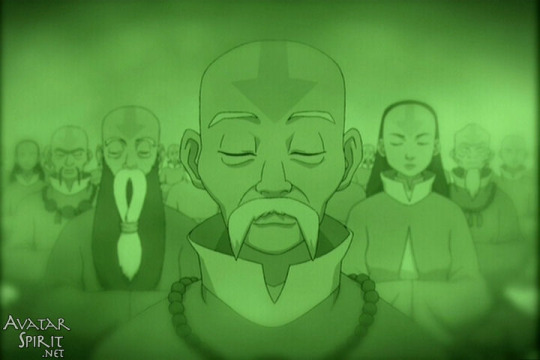
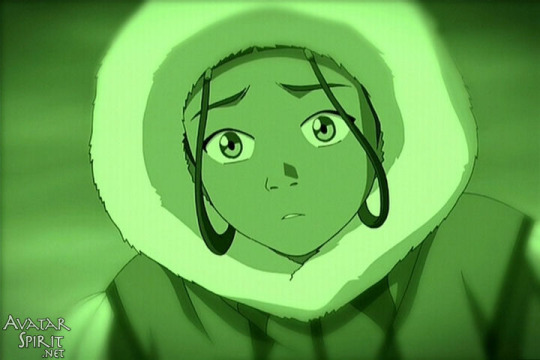
Except Aang cannot let go as he hoped he would be able to. Because his attachment to Katara is selfish, but beyond that his attachment to Katara is a replacement for his attachment to the Air Nomads — and it draws him away from his duties as the Avatar, causing him to embrace an ideal he does not comprehend. After all, the Air Nomads were not perfectly pacifistic either.
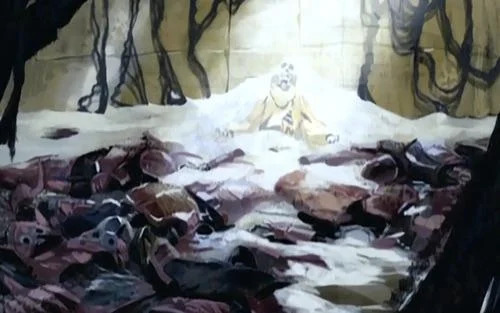
Still, just as Aang refuses to recognize the complexity in the Air Nomads’ legacies, dismissing what he may deem as an act of violence, Aang refuses to recognize the complexity to Katara’s rage and compassion, to her violent and protective nature. In my meta “On Ideals and Idealization,” I elaborate on Aang’s idealization of Katara:
Aang loves Katara, yes, but he is in love with an idealized version of her. In his mind, he holds close the idea of a gentle Katara, a smiling Katara, a compassionate and all-loving Katara. Even though he has seen her darkest moments when she bloodbends Hama - arms bent in disjointed angles, fingers curled as if manipulating puppet strings - it does not tarnish his image of her because, at this moment, she is not the persecutor, but the persecuted.
After her experience with Hama, Aang is there to comfort her and help her come to terms with the terrifying power she now possesses. With her face streaked with tears and eyes widened with horror, it is clear that this is a power that Katara does not want, that it has been thrust onto her against her own will.
The conclusion that Aang draws from this is that Katara’s inner darkness is a separate entity from her inner light, and he perceives this acquired part of her as a blemish on her inherent goodness. As such, in “the Southern Raiders,” when he witnesses how Katara’s anger and grief drive her to hunt down her mother’s killer, he equates Katara seeking closure to Katara succumbing to darkness, tainting her purity and compassion in the process.
Thus, given Aang’s reaction to Katara’s bloodbending, he may be inclined to love her in a piteous, nearly-obligatory manner. He’ll love her as the victim who lost sight and control and he’ll love her as a being of compassion and pacificity, but nothing more. Just like in the Southern Raiders, he may magnanimously grant Katara his forgiveness and his continued love even when she never asked for it. And in the end, Aang and Katara will kiss on the balcony of Iroh’s tea shop, only this time it’s not only “the hero winning the girl,” but “the bright and cheerful boy fixing the broken girl” as well.
This is the ending where Aang clings onto idealization even when it renders him a hypocrite, in the same way he is a hypocrite for shouting at his friends for pushing him to kill Ozai when it is implied he killed thousands at sea in the Siege at the North Pole.
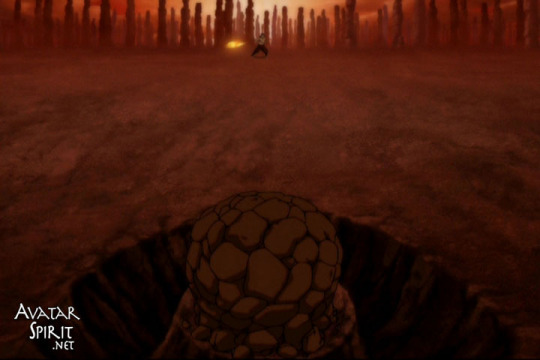
This is the ending where he does not grow.
Note: Aang retreating into a ball of earth as a narrative parallel to the beginning of the series when he was encased in a ball of ice would have been much more powerful if only Aang entered the Avatar State through character growth rather than by the power of the Pointy Rock of Destiny (TM).
Now, let’s consider an ending where Aang’s perspective broadens rather than narrows and where Aang unroots himself from the past, pulling free from stagnance. Let’s consider a hypothetical scenario in which Aang finds out Katara killed Yon Rha. How may he react?
He may not be able to at first, too torn between his belief that Katara only uses violence as a last resort and the reality that Katara uses violence as a means of agency as well. Revenge corrupts; it is a stain that cannot be washed away. There is no reconciling Katara’s previous compassionate and loving nature with this dark path she has now chosen.
Except this is Katara he’s talking about, Katara who he loves and gave up the Avatar State for. Surely there’s a way to save her, right? Yes, just as Aang told Katara before she left, forgiveness is the answer. And while Katara may not have chosen forgiveness in the end, Aang can guide her by example.
The next day, he approaches her with the offer to exempt her from her wrongdoings.
Katara, tired and mournful, looks down at Aang.
“What was so wrong about what I did?”
Inside she is hurting. There is truth to what Aang said, that revenge is poisonous both to the victim and the perpetrator, but it is not poisonous for the reasons he thinks it is. As George Orwell writes in his essay, “revenge is an act which you want to commit when you are powerless and because you are powerless: as soon as the sense of impotence is removed, the desire evaporates also” (Revenge is Sour). There’s no doubt that Yon Rha was despicable, and there’s only a little doubt in saying that his punishment should fit his crime — the only regret Katara may have here is that killing Yon Rha is a meaningless act, for she has already gained power over him in every meaning of the word. Revenge is only a gateway to senseless violence and hatred; it is not a slope from which there is no recovery, and given Katara’s emotional intelligence, she likely has or will recognize this. Although she may feel regret, she needs no one’s forgiveness.
Aang is shocked. “But violence is never the answer,” he stands by, he pleads by. His voice grows quieter. “You know that… you knew that, didn’t you?”
Katara answers him, but it’s all a blur. She says something about agency, protection, and justice. He remembers something about that too, about the fury that burned in her eyes when she declared, “I will never, ever, turn my back on the people who need me!” Then there was the hostility simmering in her glare towards Zuko, the way she muttered that she didn’t trust him, not when he could still hurt them — hurt Aang — again.
Because Katara’s anger and compassion do not simply split themselves into two identities. Instead, they coexist and coalesce into one. They drive each other; they feed into each other; they are two sides of the same coin.
Excerpt from my meta Rage, Compassion, and the Bridge in Between
The beloved ideal of Katara — the one that he thought was on the verge of being tainted, the one that never existed — shatters. But just because it’s broken doesn’t mean Aang doesn’t want to fix it. So in the days leading up to Sozin’s Comet, he tries to pick up the fragments to the Katara-he-knew and piece them together again, all the while avoiding Katara’s mournful (yet resolved) stare. He ignores the way Zuko and Katara share glances with a heaviness as if they were the only two people in the world, full of some significance he cannot grasp. Still, it haunts him like the way Zuko’s touch lingers on Katara’s shoulder or Katara’s hand brushes Zuko’s briefly whenever they don’t think anyone’s looking, reflecting a togetherness escaping loneliness.
But there’s no answer that arrives quick enough to save Aang from his doubt and confusion. All too soon, Sozin’s Comet is upon them, and Aang wanders to another world on the lion turtle's back — but this time when he listens to the past Avatars’ advice, his perspective undergoes a paradigm shift.
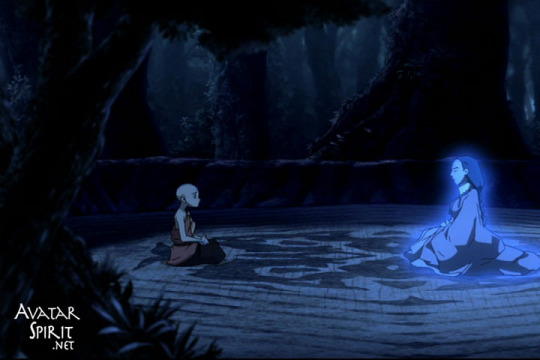
They are right. The Air Nomads that he prioritized, that blinded him to his duties — they do not exist. Their love is still there, pure and human but not all-encompassing, tucked in the corner of his heart. And Katara was the same. She was and is not all-loving or all-compassionate or all-anything, really, because she is more human than that.
This time Katara’s image shatters again. But Aang does not follow the falling pieces to the ground, desperate to find them and force them together again. No, he sees past the remains and sees Katara for who she is. For who she wants to be. For who she can be (around someone else), when she’s not compelled to take on the caretaker role just for him.
(And he thought he was so generous, offering to forgive him. But it was never his forgiveness to give in the first place.)
Aang lets go of his last attachment.
The last airbender lives on, but so does the Avatar.
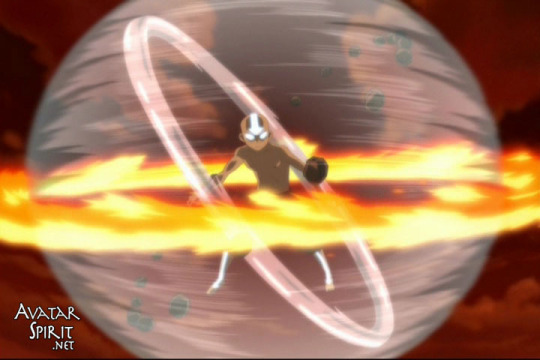
#atla#atla meta#anti kataang#anti kataang meta#zutara#aang#katara#anti aang#of sorts?#my bated breath's posts#my bated breath analyzes#i kind of rewrote aang's arc in the finale in my mind and a little bit of that slipped through#anon you asked a hard question so i gave you a 1.5k+ meta in response#i hope it's everything you ever hoped it could be#anonymous ask#ask#is tumblr hiding this post from the tags again?
379 notes
·
View notes